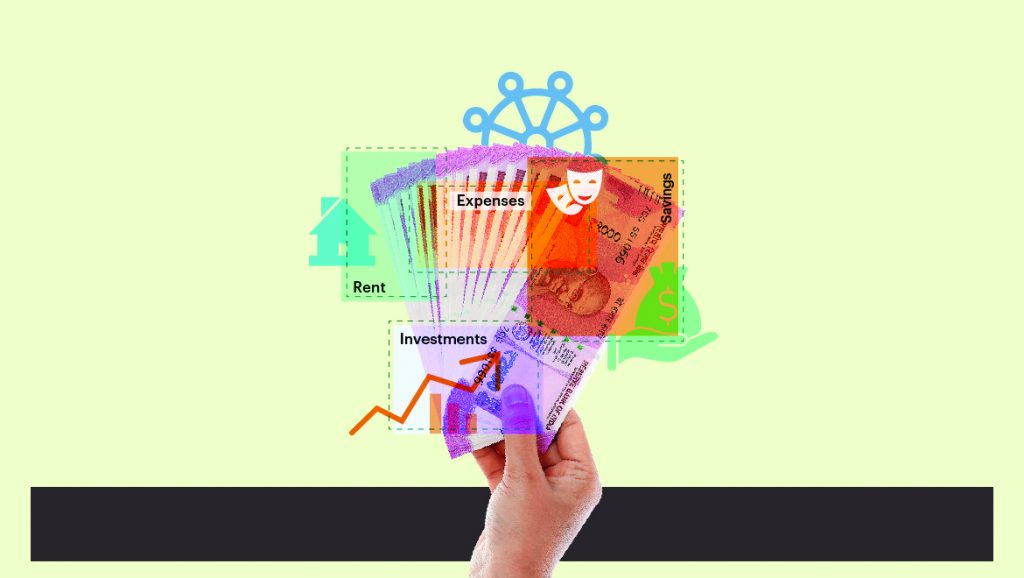Last Updated on Sep 27, 2023 by Vyshakh
Your financial health is in your hands and that you’ve come here looking for ways to recuperate your personal finance is indeed a progressive sign. For one, your personal financial health needs convalescence because you must have messed it up somehow. But, don’t you worry, money does go astray at some point in life — earlier the better, then wisdom will come to you sooner — and this happens to the best of us. Only, very few strip the power off their ignorant-self and spring back up to get their personal financial health back on track.
Here, we give you 5 failsafe money management tips that will help you improve your personal finance.
1. Plan your finances based on 50/ 20/ 30 rule
Every Tom, Dick, and Harry earns and spends, but only a few understand that budgeting is inevitable for good financial management. With some hands-on-experience, you will come to realise that budgeting is not too harsh a tool. You don’t have to reproach yourself for booking that relaxing spa session after a long month but, too much of self-love can harm your finances. That’s when a budget comes into play. It helps you allocate your income among various heads like expenses, savings, and investments, and thus make the best use of what you earn.
50/ 20/ 30 rule
When budgeting, you can use the time-tested 50/ 30/ 20 rule, where you allocate 50% of your income for necessities, 20% for savings, investment, and debt repayment, and the rest 30% for entertainment and leisure. Feel free to shift some funds from the 30%-section to the 20%-section, in case you want to get rid of the debt faster.
Let’s face it, sticking to a budget can be challenging, but once you master it (your mind essentially), you’ll realise it was the best thing you could have ever done to bring your personal finance back on track. As opposed to gone times, when you didn’t have a plan and spent on anything and everything without evaluating the urgency and importance, now, with a budget in hand, you can provide for necessary expenses and strike off the ones that only eat into your income. Over time, you will see your savings swell and finances come on track.
2. Save first and spend later
This is one of the most basic personal finance tips every human should know: the more money you have at hand, the more likely you are to spend; the lesser means you have, the less you will spend. Besides, you may also find new ways to increase your earnings, which results in higher income and extra savings. This can never be bad, would it? Getting the picture? Alright, so make amends for your long-time ignorance now by saving first and spending later.
The best way to do this is to automate your savings. Set a standing instruction allowing your bank to transfer a portion of your net monthly income (at least 10%) into your savings and investment accounts within 5 days of your payday. Gradually, you’ll see your finances swelling and heart rejoicing.
3. Be an enviably smart spender
Every often you may find yourself on an e-commerce website devouring for offers and lo! Your eyes fall upon that flashy banner on top of the page calling out to you ardently: The highest spender of every hour gets a chance to win ABC. You prepare yourself for the race and scan the entire site for things you can add to your cart. While some may be necessities, most can be name-sake-necessities you create just to inflate your spending and qualify for the contest. ‘Smart!’, you exclaim and wait for the results. What happens then depends on your luck.
Are you a smart spender indeed? Hell no! When we said ‘Be a smart spender’, we meant doing exactly the opposite. Not falling prey to offers, especially when you don’t have the financial bandwidth to do so. Also, not resorting to impulsive buying (you won’t even use half the things you buy). Every rupee counts.
It doesn’t mean you beat yourself up and live extremely below your means. On the contrary, it means being smart about how you spend; cut down unnecessary magazine and cable subscription, when you don’t have time to use it. Spending smart can also mean making a shopping list of necessities and buying them in a wholesale store or during festive offers. It can also mean embracing recycling, refurbishing, and other such concepts that can save you a few hundred to thousands. Smart; agree or nah?
4. Don’t let debts get the better of you
Amid increasing competition among lenders, and easy access to credit, borrowing has become easy. Further, rising inflation and cost of living give you all the more reasons to avail credit to meet your goals like buying a car or a home. So, you can safely say that availing loans has become a part and parcel of modern life. You avail multiple loans to meet several goals because, of course, you can’t wait forever to afford these out of your savings alone. Well, you availed several loans, no harm is done; all is good so far.
But then, enters repayment. Top your loans with a credit card and your monthly payments may surpass your ability to repay. Undoubtedly, your income can’t be a one-man-army against necessities you can’t do without, expenses that don’t seem to be merciful, and debt that is piling up by the day. Still, you have to keep the show running and the only way to do this by managing your debt smartly.
When your monthly payments are challenging your sanity, one of the best personal finance tips is to consolidate your debts into a single low-costing loan and repay all your loans using it. The outcomes: you close multiple loans and reduce your burden; you repay a single low-costing loan and save on interest; you use the differential of past and current monthly outgo to prepay or foreclose the existing loan to get debt-free sooner.
5. Keep a watchful eye on your finances
Simply implementing the above money management tips without monitoring the results is a waste of your time and efforts. Chances are it may defeat the very purpose of repairing your personal finance. If you don’t want to put yourself down, buckle up and spare some minutes of your day to look into your progress. Measure it and improve or celebrate, accordingly. Although, there is always room for improvement.
There are plenty of ways to track your finances. For starters, you can use an excel sheet and then go a step ahead by installing personal finance apps that offer end-to-end financial management services while giving you full control. For more ideas on how to manage and monitor your finances, you can also read these 5 no-nonsense personal finance books that are highly acclaimed generations swear by.
Folks, we understand that ‘personal finance’ can put you off — worse — scare the shit out of you. But be reassured, you are not the only one looking to improve their personal finance situation. Almost everyone goes through this phase; only, some are prompt enough to identify the urgency of saving their finances (and themselves) on time. Acknowledge that good financial health has a direct and significant bearing on your overall wellbeing. Remember the adage, what you sow today, you reap tomorrow. Act now, because there’s no better time!




